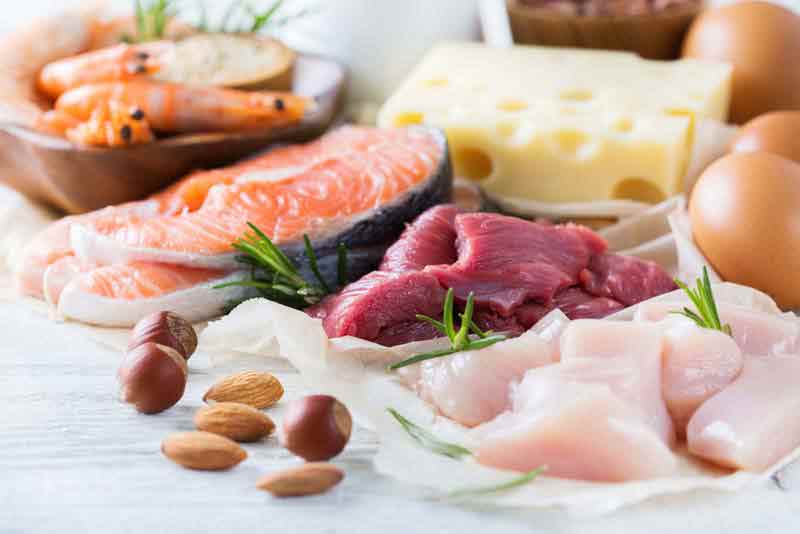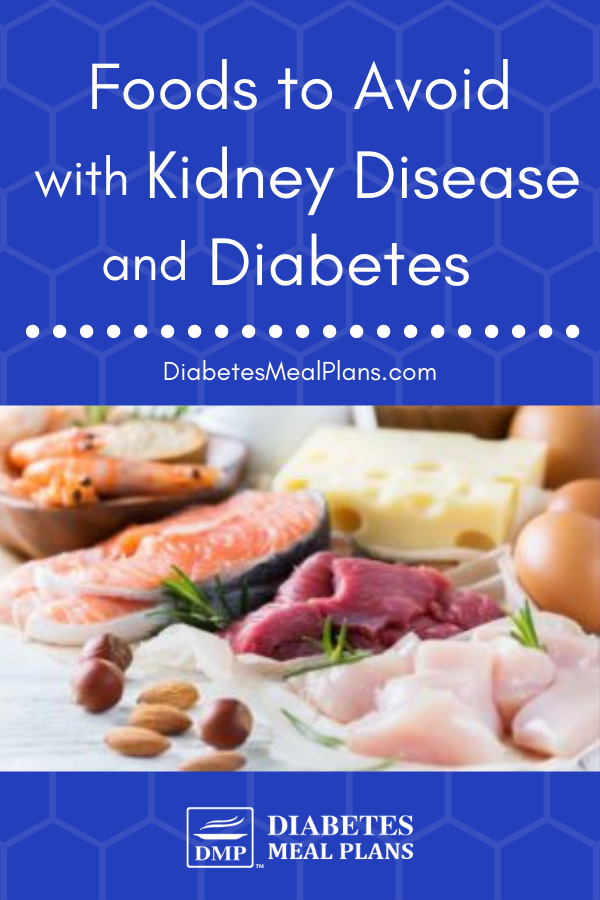Table of Contents[Hide][Show]
The relationship between your diet, kidney disease, and type 2 diabetes can be a tricky one to understand since there are so many moving parts.
If you’re curious about how your protein and electrolyte intake affects your health in the midst of kidney disease, or what foods you should avoid for kidney health, you came to the right place.
We’ve got some research-based answers to help bring some clarity to the fog.

Kidney disease in diabetes is caused by higher-than-normal blood sugar and blood pressure levels. If not taken care of appropriately, this health condition can progress to chronic kidney disease (CKD), which can make life more difficult.
The best way to avoid or slow the progression of kidney disease is to get your blood sugar and blood pressure to goal levels.
For information about how to better manage diabetes with diet please refer to our diabetes friendly food list, and choose more whole foods that are lower in carbohydrates.
However, as kidney disease progresses there are some nutrients that are normally filtered through the kidneys may need to be monitored. These include protein, sodium, potassium and phosphorus.
Protein
The average recommended protein intake for healthy individuals is 0.8g/kg/day. A low protein diet is set at 0.6-0.8g/kg/day.
You may have heard that people must restrict protein to help maintain kidney function.
The reason for limiting protein includes maintaining glomerular filtration rate (how well your kidneys are filtering) and decreasing albuminuria (protein leaking into urine).
But this concept and the actual amount of protein that is recommended is under some debate.
A meta-analysis of various low protein diet studies found that a diet of 0.6-0.8g/kg/day of protein did show decreased protein in the urine, but there was no significant change in kidney function in people with type 1 or type 2 diabetes. The average intake of protein for the low protein and control groups were 0.9g/kg/day and 1.27g/kg/day, respectively.
In another study, diabetic patients who were placed on a low protein diet (0.8g/kg/d) for one year saw no significant change in renal function.
Yes, limiting protein can aid in decreasing protein in the urine but there seems to be no clear evidence about whether this can actually slow down the progression of kidney disease.
Evidence does NOT suggest that people with diabetic kidney disease need to restrict protein intake to less than the average protein intake, which is 0.8g/kg/day.
Salt (Sodium)
Reducing salt intake may help with decreasing fluid retention, managing hypertension, and reducing cardiovascular risk, but it doesn’t necessarily have a direct effect on slowing the progression of kidney disease.
In a systematic review evaluating the effect of altering dietary salt intake in people with CKD, decreasing salt intake was found to aid in decreasing blood pressure and reducing proteinuria.
So what is a good limit?
There is debate on whether the intake of <1.5g per day is beneficial in those with impaired kidney function, but it is suggested that intake of <3g per day may be needed to aid with management of fluid retention or proteinuria.
In general, limiting to the overall recommendation of <2300mg/day can be beneficial for blood pressure, but anything less than that should be done with caution.
You need some sodium every day to maintain proper nervous system function, but you don’t want to go overboard.
Of course, when we are looking at general healthy eating guidelines a main point is to avoid highly processed foods. When these are cut out or decreased in ones diet then we are eliminating a lot of high salt foods, which may be enough to stay below the 2300mg recommendation.

Potassium
As kidney disease progresses you may need to limit dietary potassium intake depending on your blood levels. High potassium levels can lead to irregular heartbeat or a heart attack.
Blood potassium levels of less than 4.0mmol/L and greater than 5.5mmol/L have been associated with more rapid kidney disease progression and increased mortality.
Your doctor or nephrologist (kidney specialist) should be the one to tell you if you need to limit these foods or not.
High potassium foods that are lower in carbs that you may see on our recommended food list include:
|
● Avocado ● Artichoke ● Milk ● Nuts and seeds ● Broccoli |
● Brussels sprouts ● Yogurt ● Greens (except kale) ● Tomatoes |
Low potassium foods that are lower in carbs that are part of our recommended food list include:
|
● Alfalfa sprouts ● Asparagus ● Green beans ● Cabbage ● Cauliflower ● Celery ● Cucumber ● Eggplant ● Kale ● Lettuce ● Mushrooms |
● Onions ● Peppers ● Radish ● Rhubarb ● Yellow squash ● Zucchini squash ● Blackberries ● Blueberries ● Cranberries ● Strawberries ● Raspberries |
As you can see, there are plenty of food options if you do get to a point where diet alternations are needed.
Phosphorus
Phosphorus is another nutrient that may need to be restricted in the later stages of kidney disease, as kidneys in poor health become unable to filter it out and it builds up in the bloodstream.
Serum phosphorus levels >5.5mg/dL are associated with 20-40% higher mortality risk among patients with end-stage renal disease.
That being said, most people in earlier stages of kidney disease do not have to worry about limiting phosphorus.
Again, your doctor or nephrologist should be the one to tell you if you need to consider limiting phosphorus.
Main sources of organic phosphorus are protein-rich foods such as dairy products, meat and fish. Many fruits, vegetables, nuts, seeds, and legumes also contain small amounts of phosphorus.
In it’s inorganic form, phosphorus is a main component of many preservatives and additives in processed foods. These include enhanced or restructured meats, frozen meals, cereals, snack bars, processed or spreadable cheeses, instant products, refrigerated bakery products.
These inorganic phosphates in foods are more readily absorbed and have greater effect on your blood phosphorus levels in comparison to foods that naturally contain phosphorus.
Limiting processed foods prepared with phosphate additives is the healthiest way to decrease phosphate levels (plus, limiting processed foods will also have a positive impact on your overall health as well).
Common phosphate additives are listed in the table below. If you need to limit phosphorus in your diet, then make sure to avoid foods that have these things listed in the ingredients.
|
Phosphate Salt |
Found in |
|
Dicalcium phosphate |
Bakery mixes, yeast-raised bakery products, cereals, dry powder beverages, flour, food bars, infant food, milk-based beverages, multivitamin tablets, yogurt |
|
Disodium phosphate |
Breakfast cereal, cheese, condensed milk, cream, evaporated milk, flavored milk powders, gelatin, half and half, ice cream, imitation cheese, infant food, instant cheesecake, instant pudding, isotonic drinks, nonfat dry milk, pasta, pet food, processed cheese, starch, vitamin capsules, whipped topping |
|
Monosodium phosphate |
Cola beverages, dry powder beverages, egg yolks, gelatin, instant cheesecake, instant pudding, isotonic beverages, and process cheese custard pudding and no-bake cheesecake mixes |
|
Phosphoric acid |
Cola beverages, carbonated and noncarbonated beverages |
|
Sodium hexameta-phosphate |
Meat, seafood, poultry, vegetables, cream, half and half, ice cream, whey, processed cheese, eggs, table syrup, toppings |
|
Sodium tripolyphosphate |
Meat products, seafood, poultry, vegetable proteins, processed cheese, sour cream, dips, yogurt, eggs, table syrups, whipped toppings, pet food, vegetables, whey |
|
Tetrasodium pyrophosphate |
Processed meat, poultry, seafood, processed cheese, potato products, ice cream, frozen desserts |
|
Trisodium phosphate |
Processed cheese, cheese products, imitation cheese, isotonic beverages, cooked breakfast cereals |
Again, this limitation is usually only needed when kidney disease has progressed to end-stage kidney failure. At that point, dialysis may be needed and protein requirements increase.
Along with limiting inorganic phosphorus sources, your doctor may also prescribe medication called phosphate binders that you take with meals. These medications help eliminate phosphorus from your body.
As mentioned before the best way to slow the progression of kidney disease is to manage blood sugar and blood pressure.
In the earlier stages of kidney disease, you may not need to limit certain foods and the main recommendation is to avoid processed packaged foods and choose whole foods as much as possible.
If you do have diabetic kidney disease, then make sure you are following up with your primary care physician and/or nephrologist. They will be the ones to monitor your lab values and tell you if any dietary restrictions are necessary.

Kathy Rodrigues
Hi I have stage four kidney disease my creatine was very high what should I eat or not it I am also prediabetic
Jedha: Nutritionist (MNutr)
The guidelines above can be helpful, however, You should talk to a nutritionist Kathy as the individual guidelines for each person vary widely in these situations.
Robin
What can a person eat.
Jedha: Nutritionist (MNutr)
Check out our recommended food list here Robin, which may provide some guidance.
CGS
Great info on dealing with CKD and Diabetices issues…thks
Jovita
I think I got Kinsey but I can too my dr cause of the thing that going around soon what can I do
Jedha: Nutritionist (MNutr)
If you suspect kidney issues, you really need to try to get a doctors appointment to assess whether you do and how bad it is. In the meantime, you can follow a healthy diet to keep blood sugar levels under control because higher than normal levels increase risk of diabetes complications like kidney disease. Explore the resources on our website.
Starr
Just found out I am pre diabetic with stage 4 CKD. Loved your article. Hoping that your recipes will help me. Considering some pea and soy plant based meals and less regular meats.
Malorie: Dietitian (MS, RD, CLT)
Hello Starr, we are glad you found the information helpful. Nutrition recommendations with kidney disease are highly individualized so it is best to work with your physician or dietitian regarding any diet changes!
Stephanie Embrey
I have diabetes and CKF
Malorie: Dietitian (MS, RD, CLT)
Hi Stephanie, glad you found us and we hope you find our information helpful.